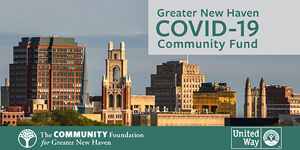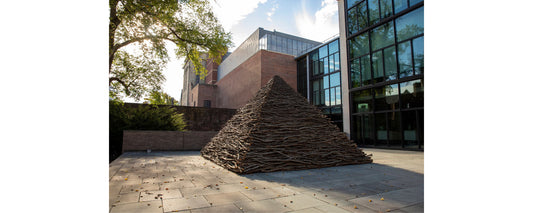It’s early April, or Week 3 of sheltering in place. Aside from birdsong and the occasional blast of drive-by reggaeton, Edwards Street is eerily quiet. Masks are starting to appear on pedestrians, just a trickle compared to the usual bustle of graduate students and young professionals, and those pedestrians are keeping a healthy distance from each other, swerving into driveways or the street to maintain the recommended two yards’ distance. The conversations that do occur feel both subdued and amplified. Coughs and sneezes? Deafening.
Inside, things are no less peculiar. My apartment building on Edwards houses a cross-section of New Haveners affected by the coronavirus pandemic: substitute teachers, service industry workers and freelancers of varying stripes.
sponsored by
Resident Elizabeth Nearing freelances full-time as a meeting facilitator. Sitting on her stoop with her regal beagle, Reginald, she muses about all the recent changes to her life and livelihood. “What I do, essentially, is professionally build gatherings. My background is in theater doing community-based work, and now I mostly facilitate processes and practices that are about building community knowledge or input across different backgrounds.” But that’s a difficult thing to do in a time of citywide quarantine, and it’s upended the usual balance she strikes. “I live alone because I live a massively social and communal-oriented life,” she says. “Two of the biggest parts of my life were ripped away in the last few weeks.”
Nearing notes she’s in the planning stages of several upcoming contracts and finds herself thinking often about after. “How are we going to collectively grieve, how do we retransition? How is our societal and communal relationship to touch going to be impacted? I hope coming out of this that our capacity to build better and more caring systems of supporting each other grows. Obviously I wouldn’t wish this virus on anyone or anything ever, but while it’s illuminating big flaws in this system, it’s uplifting people already doing the work,” she says, such as medical workers. She gives Reginald a hug and cites the Mr. Rogers quote, “Look for the helpers.”
On a more immediate level, she says she’s seen a change. “Saying hi has more depth, now… The interactions are longer because they are more meaningful.” Reginald wanders over and cuddles up to her, sniffing the air, a picture of contentment. “Gratitude work is really hard right now,” she says, before invoking Reginald. “Walking with my little dude has been an important ritual for me in this time.” When she was busier, sometimes taking the dog out felt like a hassle, but now it’s one of the most important parts of her day. Reginald, meanwhile, paws at a stick just out of reach.
Neighbor Bobby McAdams can relate. McAdams has been temporarily laid off as a manager of local fine dining spot Shell and Bones, and his family and friends are both nearby and out of reach. His two daughters are weathering the pandemic with their mother in Branford, and though he still has the company of his beloved yellow lab, Dexter, he misses getting together with his social circle—and his coworkers, as Shell and Bones opted to fully shut down instead of transitioning to takeout-only. “I’m actually planning on texting my Tuesday night crew from Shell and Bones later, since it would be our night together.” He adds, “I’m a routine guy, I really need a routine or else it all goes off. When we all get back to normal, I’m never taking my life and my routine for granted again.”
Despite the current situation, McAdams remains optimistic about the prospects for local restaurants—the ones that survive, anyway. “People are going to want to go out as soon as they can,” he predicts, though he is concerned about the possibility of losing a whole season—or maybe two. The loss of the Yale population, including the big influx of spending that would have come during commencement weekend, is hitting the restaurant industry hard and will make the summer harder. If the quarantine extends into summer, it might force seasonal restaurants—the ones closed during the colder months—to close up for good.
As we speak, the end of the month looms on the horizon, and both rent and scuttled moving plans are on McAdams’s mind. “I was perfectly lined up to find something nice… and now I’m not.” Aside from inconveniences like having to view apartments remotely, the financial barriers are more extreme for those who’ve been furloughed (or worse). “There’s a friend of mine who offered a room in her house in Ansonia, but to come up with first month rent and security deposit and not have a job isn’t doable. Could I blow through all my savings in one month? I could… but i’m not going to. It’s not financially responsible.”
Like Nearing, McAdams is grateful for Dexter’s canine companionship, which seems to have helped him keep an ultimately positive mindset. “I don’t know when everything’s going back to ‘normal’ normal—
“All of this is so brand new, but we’re doing it. We’re all going to have bad days, and better days, and weird days. You can’t change it. You just have to go with it.”
Written and photographed by Allison Hadley.








